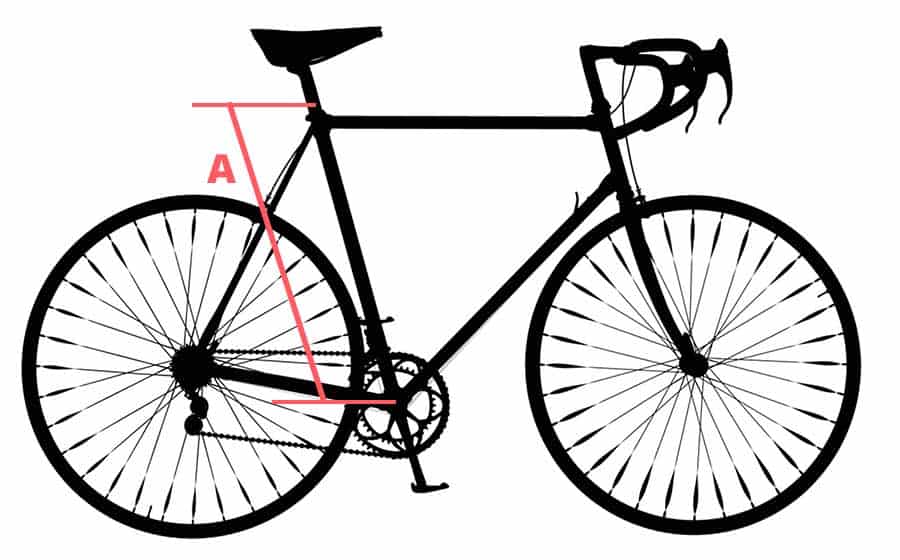Our Bicycle Frame Size Calculator will tell you the bike size you need. The Bicycle Frame Size Calculator is super easy to use – just choose your preferred bike type and enter your measurements.
Useful information and FAQ regarding the Bicycle Frame Size Calculator
1. What is the Bicycle Frame Size?
The bicycle frame size is essentially the length of the bicycle’s saddle tube, that is, the distance from the crankshaft axis to the end of the saddle tube (see on the picture). The Bicycle Frame Size Calculator gives this size in centimetres or inches.
2. How does the calculator compute the optimal bicycle frame size?
The Bicycle Frame Size Calculator is based on internationally accepted standards recommended by bicycle manufacturers and also bicycle experts. These standards always take into account the height, the age (adult or child), on some bicycle types also the gender and the type of bicycle (e.g. Mountain Bike, Highway, Urban, Trekking, Triathlon, BMX) given the optimal size of the bicycle frame. However, don’t forget that these calculations take into account the average body layout, but each and every one of us is different. Therefore, we recommend that you choose your bicycle not only on the basis of the calculator but also on the basis of a personal test.
3. Why is the bicycle frame size sometimes given in metres and sometimes in inches?
The unit used to specify the frame size is usually a matter of custom; for MTB bikes, it is given in inches for road bicycles it’s always in metres. If you are confused with the different type of units, you can use our Length Unit Converter.
4. What does the wheel size of the bicycle matter?
Bicycles are characterized not only by their frame size but also by their wheel size. In terms of wheel size, there is usually much less choice. Wheel size is usually given in inches (inches) in almost all cases. 1 inch is approx. 2.54 cm and 1 cm is 0.3937 inch.
• Typical wheel sizes for children’s bikes are 12-24 inches
• Typical wheel sizes for MTB bikes: 26-29 inches
• Typical wheel sizes for city bikes: 26-28 inches
• Wheel sizes for trekking, cross-trekking, and road biking: 28 inches
5. What is standover height and what can it be used for?
The standover height is mostly used for road bicycles and mountain to determine the exact frame size of the bicycles, but this is another type of approximation.
6. How can I determine the standover height?

A – Standover height
The standover height is essentially the distance of the groin from the ground. The easiest way to determine is to put a book between your feet so that the back of the book reaches up to your groin. Next, tighten the book and stand in a small swath (your feet should be in line with your shoulders). You get the standover height by measuring for you the distance between the ground and the top of the book.
For road bicycles, the required frame size is calculated from the standover height by multiplying the height by 0.66. For MTB bikes, the frame size can also be calculated from the standover height, but in this case, it should be multiplied by 0.57 or converted to an inch if necessary.
7. How do I choose a bicycle?
Think about what you will use the bike for. Here’s how to help. After that, if you have already selected the right type, use the Bicycle Frame Size Calculator or the Bicycle Size Chart below.
• Mountain Bike (MTB): redesigned for off-road cycling. All mountain bicycles feature sturdy, highly durable frames and wheels, wide-gauge treaded tires, and cross-wise handlebars to help the rider resist sudden jolts. Some mountain bicycles feature various types of suspension systems (e.g. coiled spring, air or gas shock), and hydraulic or mechanical-disc brakes. Mountain bicycle gearing is often very wide-ranging, from very low ratios to mid ratios, typically with 16 to 28 gears, although some riders prefer the mechanical simplicity and ease of maintenance of single-speed mountain bikes.
• City bikes: These bikes have larger wheels, with no gear. The comfort is a must.
• Road Bike: The road bike is designed to go fast on a paved road. The disadvantage is that it is extremely sensitive if the road is not mirror-smooth.
• Trekking, cross trekking bikes: Trekking and cross trekking bikes are a transition between MTB and road bikes, combining the benefits of the two categories (thinner and bigger wheels for faster riding, but they are still resistant ).
• Triathlon Bicycles: Triathlon bikes are specifically designed for racing and are “more competitive” than road bikes. These bicycles have seat posts that are closer to vertical than the seat posts on road racing bicycles.
• BMX bikes: BMW bikes were introduced in the 60s, also for racing purposes, these type of bikes are designed for stunts, tricks, and racing on dirt tracks. They have a single gear ratio with a freewheel and are built with smaller frames and wheels with wider, treaded tires.
8. Bicycle frame size chart
| BICYCLE TYPE | HEIGHT (cm) | HEIGHT (inch) | RECOMMENDED FRAME SIZE | SIZE CLASS |
| MOUNTAIN BIKE (MTB) FRAME SIZE | 148 – 158 | 58 – 70 | 13″ – 14″ inch | XS |
| 158 – 168 | 62 – 75 | 15″ – 16″ inch | S | |
| 168 – 178 | 66 – 79 | 17″ – 18″ inch | M | |
| 178 – 185 | 70 – 82 | 19″ – 20″ inch | L | |
| 185 – 193 | 73 – 86 | 21″ – 22″ inch | XL | |
| 193 – 198 | 76 – 88 | 23″ – 24″ inch | XXL | |
| ROAD BIKE FRAME SIZE (MALE) | 148 – 152 | 58 – 67 | 47 – 48 cm | XXS |
| 152 – 160 | 60 – 71 | 49 – 50 cm | XS | |
| 160 – 168 | 63 – 75 | 51 – 52 – 53 cm | S | |
| 168 – 175 | 66 – 78 | 54 – 55 cm | M | |
| 175 – 183 | 69 – 81 | 56 – 57 – 58 cm | L | |
| 183 – 191 | 72 – 85 | 58 – 59 – 60 cm | XL | |
| 191 – 198 | 75 – 88 | 61 – 62 – 63 cm | XXL | |
| ROAD BIKE FRAME SIZE (FEMALE) | 147 – 155 | 58 – 69 | 44 – 45 – 46 cm | XXS |
| 155 – 160 | 61 – 71 | 47 – 48 – 49 cm | XS | |
| 160 – 165 | 63 – 73 | 50 – 51 – 52 cm | S | |
| 165 – 172 | 65 – 76 | 53 – 54 – 55 cm | M | |
| 172 – 180 | 68 – 80 | 56 – 57 cm | L | |
| TREKKING / CROSS TREKKING FRAME SIZE | 147 – 155 | 58 – 69 | 13″ – 14″ inch | XS |
| 155 – 165 | 61 – 73 | 15″ – 16″ inch | S | |
| 165 – 175 | 65 – 78 | 17″ – 18″ inch | M | |
| 175 – 183 | 69 – 81 | 19″ – 20″ inch | L | |
| 183 – 191 | 72 – 85 | 21″ – 22″ inch | XL | |
| 191 – 198 | 75 – 43 | 23″ – 25″ inch | XXL | |
| TRIATHLON BICYCLE FRAME SIZE | 152 – 160 | 60 – 71 | 49 – 50 cm | XS |
| 160 – 168 | 63 – 75 | 51 – 52 cm | S | |
| 168 – 175 | 66 – 78 | 53 – 54 cm | M | |
| 175 – 183 | 69 – 81 | 55 – 56 cm | L | |
| 183 – 191 | 72 – 85 | 57 – 58 cm | XL | |
| 191 – 198 | 75 – 88 | 59 – 60 – 61 cm | XXL | |
| CITY BIKE FRAME SIZE | 165 ↓ | 65 ↓ | 26″ wheel size | – |
| 165 ↑ | 65 ↑ | 28″ wheel size | – | |
| BMX FRAME SIZE | 110 – 122 | 43 – 54 | 16″ inch | – |
| 122 – 147 | 48 – 65 | 18″ inch | – | |
| 147 – 193 | 58 – 86 | 20″ inch | – | |
| CHILD BIKE FRAME SIZE | 85 – 100 | 33 – 44 | 12″ wheel size | – |
| 100 – 110 | 39 – 49 | 14″ wheel size | – | |
| 110 – 120 | 43 – 53 | 16″ wheel size | – | |
| 120 – 135 | 47 – 60 | 20″ wheel size | – | |
| 135 – 145 | 53 – 64 | 24″ wheel size | – | |
| 145 ↑ | 57 ↑ | 26″ wheel size | – |
